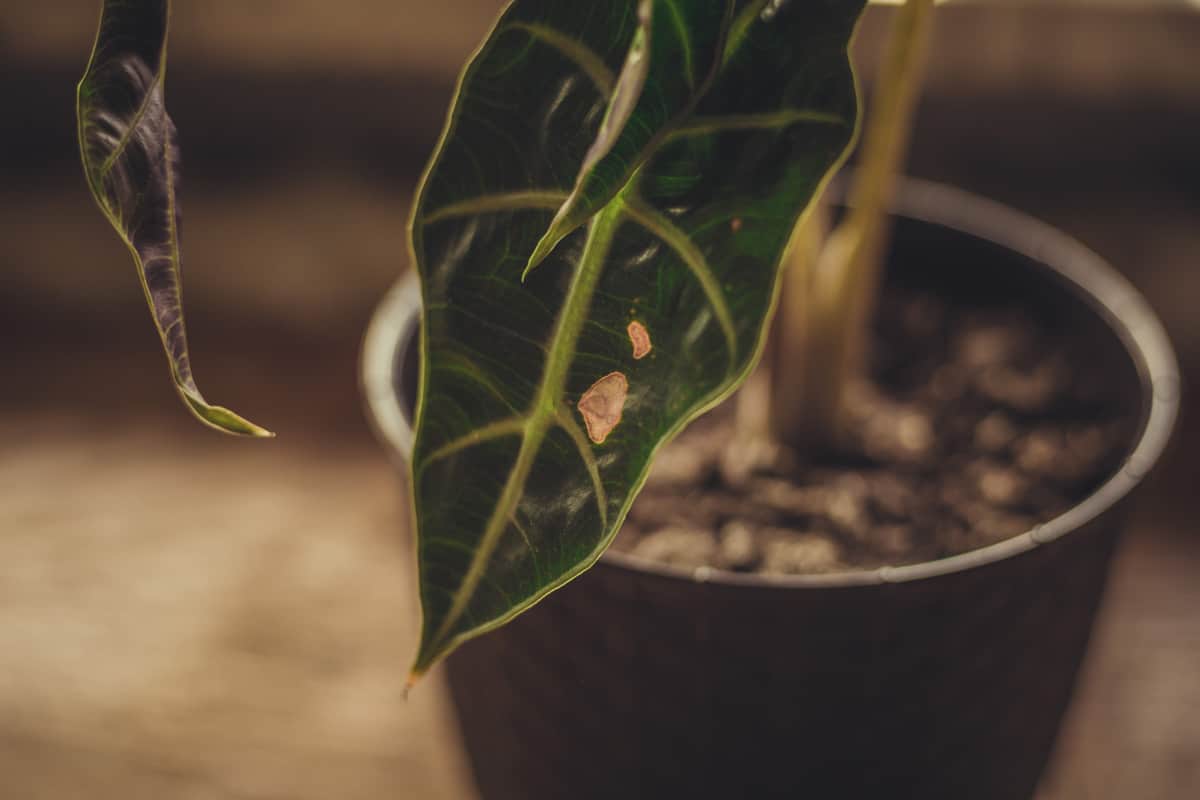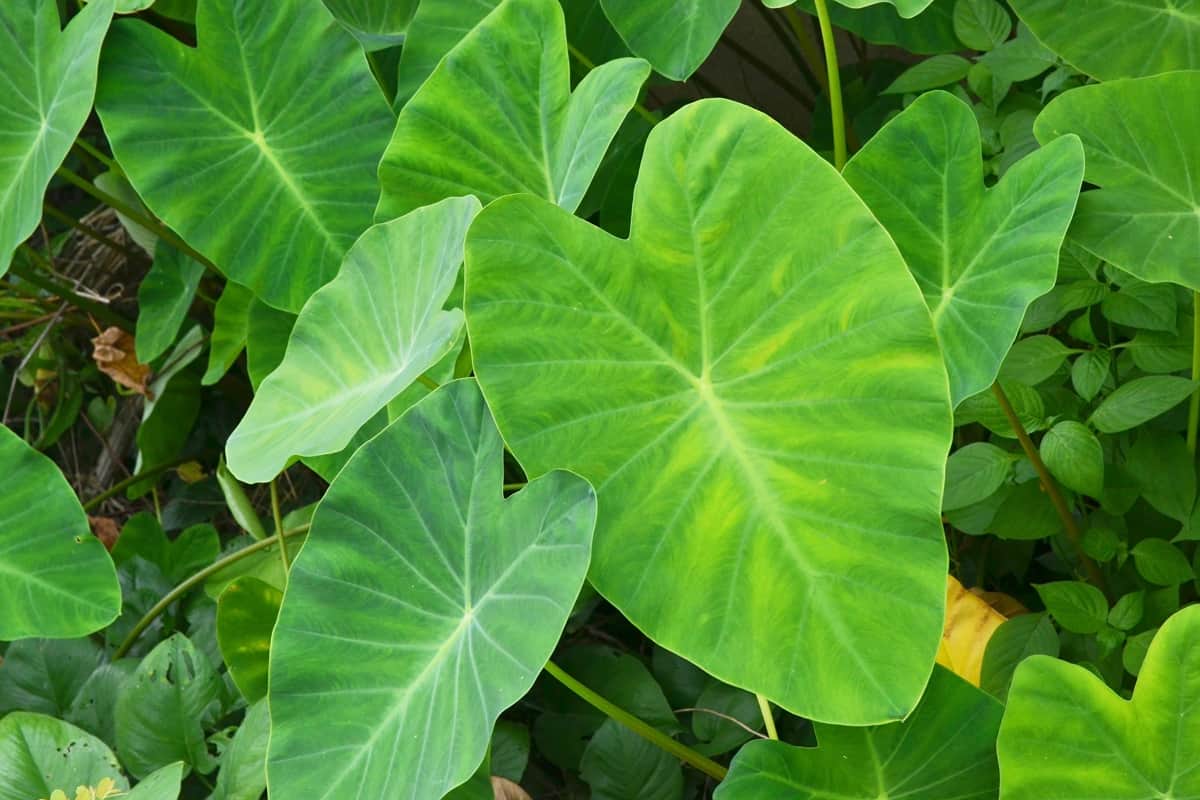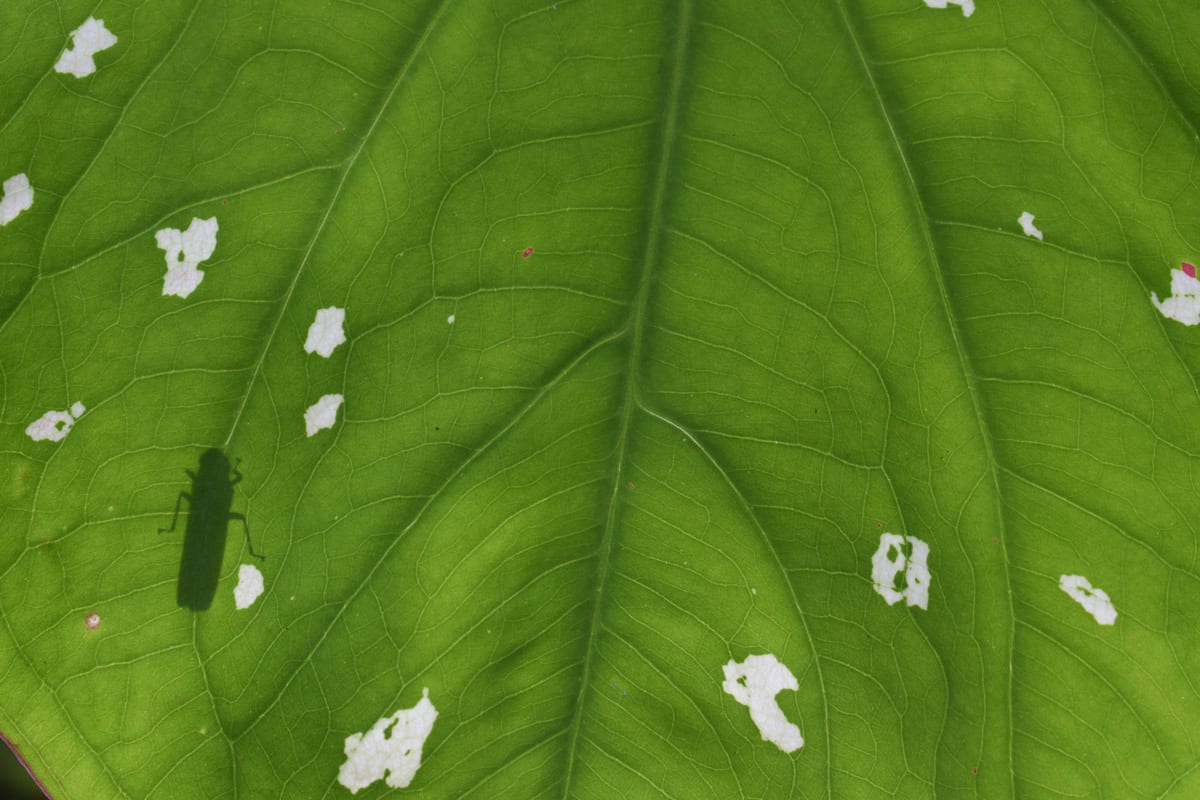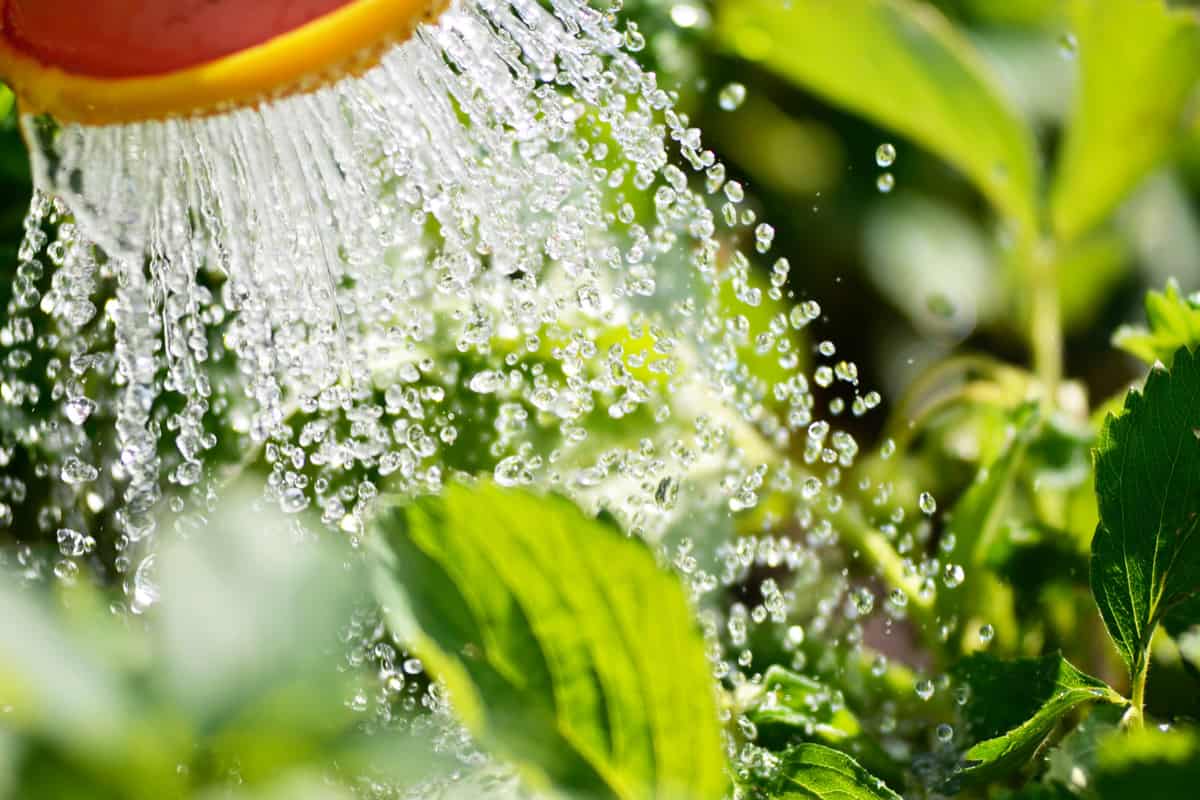The main attraction of Elephant Ears is their large, wide leaves. So, it is all the more obvious when something is eating your Elephant Ears. Spotting little holes and brown spots on your Elephant Ears is never a good sign. In this post, we lay out our research to help you stop this problem from happening.
Insects are the main culprits behind what is eating your elephant ears. This includes mites, caterpillars, beetles, aphids, weevils, and many others. Alternatively, you could also be dealing with fungus or plant illnesses. Larger animals are not usually going to eat your Elephant Ears. This means you can rule out rodents.
With this, protecting your Elephant Ears mostly involves combatting insects and infections. You can stop insect attacks by using water sprays, neem oil, or horticultural oil. You can also try relocating your plant in case its current area is unsafe. Revitalizing your plant will help it stand a better chance against insect attacks in the future.
Having your Elephant Ears go through recovery after being eaten by pests can be a difficult time. You may be unsure which creature is causing the problem, so you do not know how to solve it. In the following sections, we will provide you with more information regarding what to do. Read on to learn more!
![An elephant ear plant, What Is Eating My Elephant Ears [And How To Stop It]?](https://gardentabs.com/wp-content/uploads/2022/10/52.-What-Is-Eating-My-Elephant-Ears-And-How-To-Stop-It.jpg)
What Could Be Eating My Elephant Ear Plants?

As we mentioned, if something is eating your Elephant Ears, it is usually some type of insect. Aphids and mites, particularly spider mites, are most common in Elephant Ears. You can tell that insects are harming your elephant ears when you find holes in the leaf or stem of your plant.
Holes where insects have eaten, will tend to turn brown and wither over time, thus ruining the look (and health) of your plant. If the browning and yellowing are caused by fungus or another infection, you will also notice odd growths. These can spread to nearby plants.
These pests may come from the area where you plant your Elephant Ears. Infections and infestations can also come from other plants in the surroundings or from outside contamination that makes its way into the garden.
As soon as you notice something is wrong, take immediate action. You will want to get rid of any pests before they can cause further harm to your plants. This will involve extra steps in their maintenance.
Generally, the methods to stop pests from eating your plant will be the same for insects, fungi, and infections. Although, you may find that some solutions work better than others.
How Do You Protect Elephant Ear Plants?

When it comes to things that eat plants, the protocol is to use water spray, neem oil, or horticultural oil. These are the primary solutions for any plant, not just Elephant Ears.
Spraying Water
The idea behind spraying water is to wash off any insects on your plant. Every day for a few days, blast your plant with jets of water that are strong enough to push off anything off the surface of your plant but gentle enough not to damage the plant itself.
Doing this, you create an inhospitable environment for any pests. You can also potentially spray away any aphids using this method. Granted, spraying water is not entirely effective when dealing with fungus and other infections. This is where the other methods could prove better.
Using Neem Oil
Neem oil is a natural pesticide. You can find neem oil products and sprays easily, not just for your plants but for animals and humans. It is a natural insect repellent that works by agitating their immune systems, making any exposed insects unable to live long or produce eggs.
To use neem oil on your plant, you can either buy a product off the shelves or make a spray yourself. Add around a teaspoon of neem oil to every liter of water. You can also include another teaspoon of mild liquid soap in the mixture. Take care when using neem oil on your Elephant Ears. Neem oil spray is still a chemical that could cause harm when not used properly.
Avoid sun exposure for your plants immediately after using neem oil to avoid burning them. You can keep your Elephant Ears inside or cover them with shade while outside when giving any neem oil treatment. You should spray your plant with neem oil once a week.
Click here to see Neem Oil Spray on Amazon
Using Horticultural Oils
In general, horticultural oil refers to any oil-based pesticide. This includes neem oil. There are various options for horticultural oil that you can choose from, each with specific features.
You can use a horticultural oil made to target fungus and other illnesses. Use the oil as per its instructions. This will usually involve diluting it with a ratio of water before spraying it on your Elephant Ears.
Like neem oil, treat your Elephant Ears with horticultural oil once a week. This will help stop any insects, fungi, and infections. Even after the pests have gone from your plant, you can continue to treat it with horticultural oil as a preventative measure.
If you choose to continue treating your plant with oils and the like, check how it affects your plant. You may have to make adjustments every once in a while to be more effective or less severe on your Elephant Ears.
Click here to see Monterey Horticultural Oil on Amazon
Why Do Elephant Ear Plants Attract Bugs?

Elephant Ears are tropical plants. They thrive best in warm, humid environments. Unfortunately, these are also the conditions that will attract bugs to your plants!
Indoor plants are especially susceptible to this, primarily due to a lack of air circulation. Fewer elements will prevent insects and pests from thriving in these environments.
So, it is best to move your indoor potted Elephant Ears around or at least make an effort to increase indoor air circulation. With more circulation, insects have a way out and will not congregate so much around the plants.
As for outdoor Elephant Ears, you will also want to inspect any neighboring plants for infestation. Try to find possible sources of the pests so you can find a way to eliminate them entirely.
Avoid Being A Carrier
There is a reason why some plants are illegal to cross between different borders. Unfamiliar plants from the outside can carry contaminants that your local plants cannot handle.
You and other animals can similarly carry infestations into the garden. To avoid this, follow good sanitation practices when entering the house or garden. Trim and weed your plants, and do not introduce any new plants without inspecting them first.
Have a designated trash bin for diseased and infected plant matter. Sanitize your tools regularly. Maintain the overall cleanliness of your garden, and you can trust that your plants will continue to stay healthy and disease-free.
How To Care For Elephant Ears

It does not take much to care for Elephant Ear plants when grown in the right environment. In the US, Elephant Ears grow all year in hardiness zones 9 through 11. They enjoy humidity and need a lot of indirect sunlight. Do not place them directly under the sun to keep them from drying up.
You can also grow these plants in hardiness zones three through eight. If you do, you must overwinter the Elephant Ear bulbs during the cooler months. You can plant them again as soon as the frost ends and the spring begins.
Elephant Ears need a lot of nutrition to thrive. Fertilize them monthly. Each week, Elephant Ears need up to three inches of water. Ensure that the pot these plants are in has a good drainage system since they have to be constantly exposed to fresh water.
Grow your Elephant Ears in soil that has high organic content. Elephant Ears grow pretty well in smaller places, so long as the roots have enough space. The pot and bulb size will also affect how big your Elephant Ears can get.
Spray your Elephant Ears with horticultural oil once a week to protect them from pests. You can follow the tips we have laid out in the sections above when doing so.
Wrapping Things Up
Insects like aphids and spider mites are known to eat Elephant Ears. Different types of plant fungi and illnesses can cause problems as well. You can stop the harmful effects of these pests by spraying down your plants with water and horticultural oils.
Another way to protect your Elephant Ears is by giving them a safe and clean location to grow in. Finally, nourish them properly to maintain their health throughout the year.
Did you find this post helpful? If you did, check out our other articles before you go!


